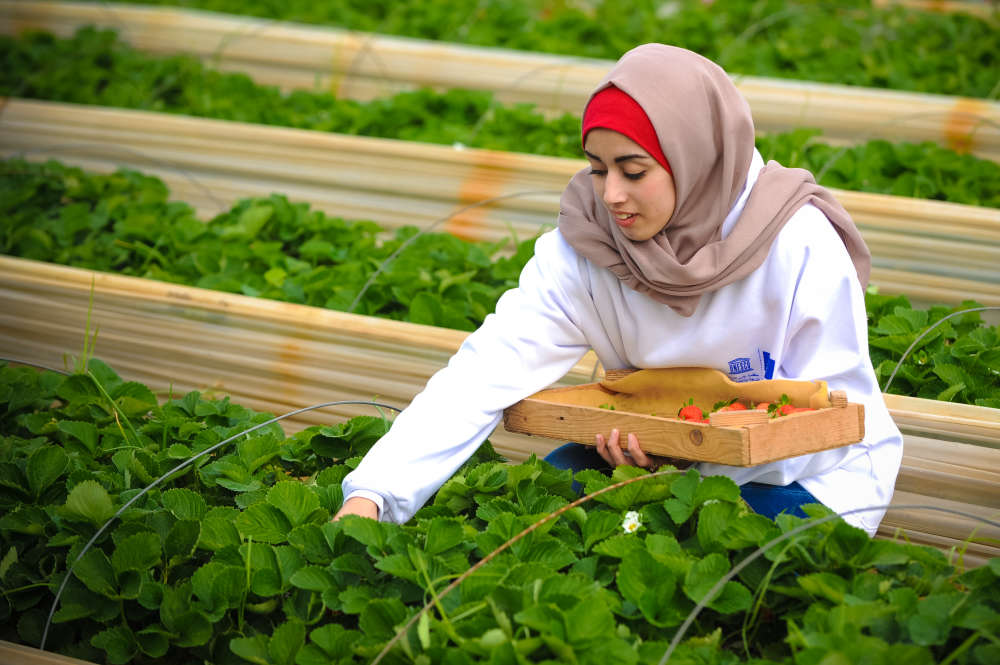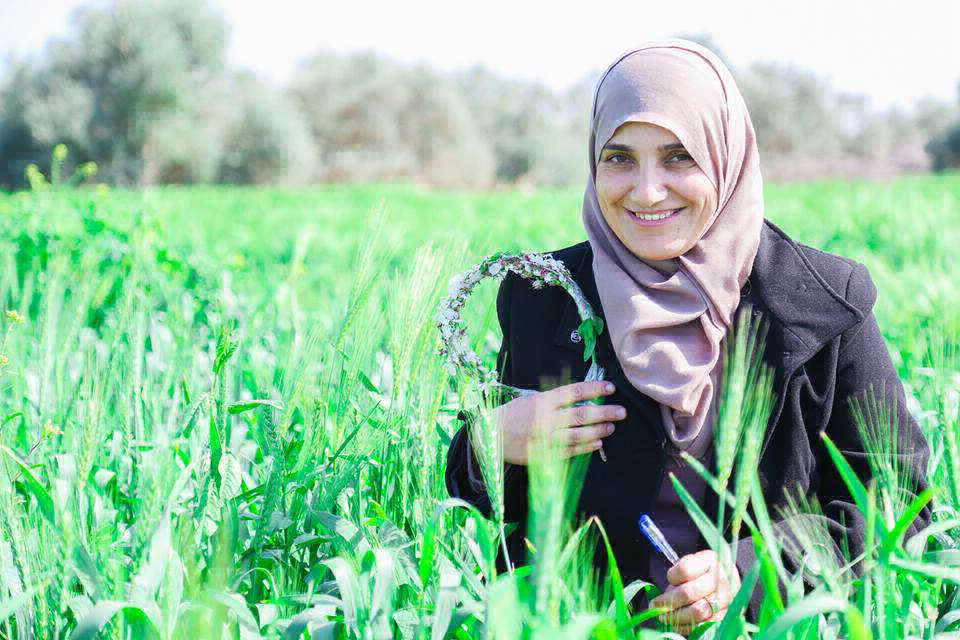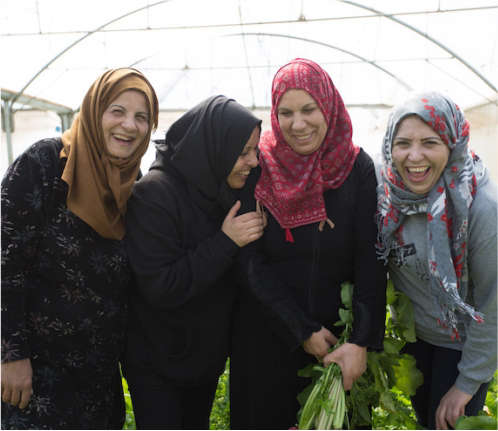By: Lodovico Folin-Calabi, Hilde Haraldstad and Ulziisuren Jamsran
International Women’s Day celebrates on March 8 the global movement for women’s rights, and offers the opportunity to put calls for equality and justice into action, empower women in all settings, and celebrate the activists who are working relentlessly to help women claim their rights and realize their full potential. This year, echoing the priority theme of the upcoming 62nd session of the UN Commission on the Status of Women (CSW), International Women’s Day will draw attention to the rights and activism of rural women under the theme “Time is Now: Rural and urban activists transforming women’s lives.”
Rural women make up over a quarter of the world’s population and constitute the majority of the 43 percent of women in the global agricultural labor force. For far too long, however, the rights, livelihoods, and wellbeing of rural women and girls have been overlooked or incompletely addressed in policies, budgets, investments, and interventions at all levels and across all countries. As a result, less than 20 percent of landholders worldwide are women. And while the global pay gap between men and women stands at 23 percent, in rural areas it can reach 40 percent.

UN Women has been working with excluded and marginalized women in rural areas in Palestine, supporting their efforts to improve their living standards and achieve social, economic, and political participation. The new Strategic Note of UN Women in Palestine (2018-2022) aims to further this investment through three main impact areas. The goal is that
1. women have income security, decent work, and economic autonomy;
2. women and girls live a life free of violence; and
3. women lead, participate in, and benefit from peace and security and from humanitarian action and recovery efforts.
To advance the rights of rural women through economic empowerment, we continue to work with women and promote their access to decent work in collaboration with the International Labor Organization and with the support of the Italian Agency for International Cooperation. We engage in efforts to create an enabling environment that promotes women’s labor market participation on the basis of equal opportunity and non-discrimination, and through the direct capacity development of women. Thereby and in line with its normative mandate, UN Women is supporting Palestine in fulfilling its obligations under the Convention on the Elimination of All Forms of Discrimination against Women (CEDAW). A wide range of support measures at the policy- and institutional levels are being provided, with UN Women working in cooperation with the Office of the United Nations High Commissioner for Human Rights. Such support measures include also the enhancement of the CEDAW reporting and implementation capacities of women’s and human rights organizations.

Furthermore, UN Women contributes to the strengthening of women’s access to justice and the fulfilment of their rights. It engages in the capacity building of Palestinian security and justice institutions, supports the improvement of the legislative environment, and works directly with women survivors of violence. These initiatives are undertaken within the framework of various programs that include Sawasya, the UNDP/UN Women/UINICEF Joint Programme “Promoting the Rule of Law in Palestine.”i In order to empower female survivors of violence and to help them recover from trauma, we are contributing towards efforts to increase the availability, accessibility, and quality of essential services. An increasing focus must target and improve coordination among the partners who are working on eliminating violence against women (EVAW), as synchronized efforts will achieve better and more sustainable results.
In order to advance women’s rights at home and in the workplaces, UN Women is inviting both men and women to engage as equal partners in achieving gender equality and securing the empowerment of women. To this end, it is important to produce evidence-based research that may guide policy changes, to strengthen the capacities of civil society organizations and youth groups, and to develop community-based activities that are founded on innovative approaches and south-south exchanges. We are making strides to encourage women’s participation in securing peace and security as well as in humanitarian and recovery efforts in Palestine. UN Women is leading among the actors who engage in mainstreaming gender in humanitarian programming, and it provides support to civil society organizations in their promotion of the implementation of Palestine’s UN Security Council Resolution 1325 National Action Plan.ii
In celebration of International Women’s Day 2018, UN Women reiterates its commitment to gender equality and to the empowerment of rural women and girls, so they may fully enjoy all their human rights. We call on our partners to intensify their actions, based on earlier commitments, by increasing their investment into the wellbeing and human rights of rural women and girls in Palestine. Using this opportunity, UN Women furthermore would like not only to thank its national and international partners who have up-scaled their commitments towards achieving much higher results in order to give due recognition to the change that has been initiated and is being led by women in Palestine.
UNESCO considers gender equality one of its main pillars and a global priority, as reflected in the UNESCO Priority Gender Equality Action Plan (GEAP) 2014–2021.iii In Palestine – through the Joint MDG-F Program on Culture and Development (2009–2012)iv
– UNESCO has worked over the last few years in partnership with the UN’s Food and Agriculture Organization (FAO), UNDP, and UN Women, as well as the Palestinian ministries of culture, agriculture, women’s affairs, tourism and antiquities, and planning and administrative development in order to safeguard and promote Palestinian cultural diversity as a means of fostering social cohesion and inclusive economic growth. Among the program’s achievements were first, the development of a knowledge-based tool for understanding, managing, and disseminating data on Palestinian intangible cultural heritage (ICH), which included a gender lens review and an archive for ICH that covers the three domains of traditional agricultural knowledge, fisher(men/women) culture, and food culture. Secondly, the establishment of a comprehensive program for the production and marketing of local agro-biodiversity products; hereby approximately 150 women entrepreneurs from seven women’s associations benefitted from capacity building in the production and marketing of high quality food products, using and perpetuating traditional crop varieties and processing methods.
Palestine’s National Policy Agenda (NPA) 2017–2022: Putting Citizen’s First, outlines the Palestinian Authority’s plan that aims to ensure the safety and security of the Palestinian people by institutionalizing democratic principles, fairly enforcing the rule of law, preserving Palestinian shared identity and cultural heritage, and strengthening resilience of the Palestinian people.vi Pillar 3 of the NPA is Sustainable Development, which, among others, includes three national priority areas relevant to rural women’s development and activism. These areas are: National Priority 6, which aims to ensure economic independence and entails national policies towards building Palestine’s future economy and creating job opportunities; National Priority 7, which aims to promote social justice and the rule of law, as well as gender equality and women’s empowerment; and National Priority 10, which aims to create resilient communities, revitalize agriculture, and strengthen rural communities.
Through its Priority Gender Equality Action Plan (GEAP), and as part of its activities that aim at advancing gender equality in Palestine – as included in the United Nations Development Assistance Framework for Palestine 2018-2022 (UNDAF)vii – UNESCO supports national policies for sustainable development that are gender-transformative and empower women and men from all walks of life, so all may contribute to and enjoy the benefits of sustainable development and peace. Therefore, UNESCO’s approach includes mainstreaming gender in all planned actions, including legislation, policies, and programs. From design to implementation and within its wide contribution, our agency works towards the fulfillment of Sustainable Development Goal 5 (“To achieve gender equality and empower women and girls”) within UNESCO’s broad contribution to the implementation of the 2030 Agenda for Sustainable Development. It is in this framework that UNESCO, thanks to generous funding by the Government of Norway, has throughout the years supported the establishment of a Gender Policy Institute (GPI), designed as a gender policy think-tank with the aim to assist the Palestinian Ministry of Women’s Affairs, together with other key line ministries and relevant national entities, in the formulation and review of gender-related policies.

Women’s rights and gender equality are not only a priority domestically, but also part of Norway’s global efforts. We are pleased to work closely both on a global level and here in Palestine with UN Women, UNESCO, and other local and international partners to promote women’s rights, participation, empowerment, and protection. We value our close cooperation with the Palestinian Government and with the active civil society here in Palestine, engaging in support of the efforts that follow up on international treaties and commitments in order to empower women, strengthen their inclusion and role in society, and fight gender-based violence. Enabling high quality education multiplies girls and women’s economic choices and increases their voice and influence in society. The Education 2030 agenda recognizes that gender equality requires an approach that “ensures that girls and boys, women and men not only gain access to and complete education cycles, but are empowered equally in and through education.”viii Large gender gaps exist in access, learning achievement, and continuation in education in many countries, most often at the expense of girls. According to UNESCO’s Institute for Statistics, despite progress, more girls than boys still remain out of school – as 16 million girls worldwide will never set foot in a classroom, and women account for two thirds of the 750 million adults without basic literacy skills.
But achieving gender equality is not just about girls. We must educate boys and young men to respect girls and women and to recognize that gender equality and inclusion of women benefits all. Inclusion of women is also important for sustainable economic growth and development. It is estimated that raising women’s labor force participation rates worldwide to male levels could add US$ 12 trillion, or 26 percent, to the global GDP by 2025.ix
Experience also shows that the inclusion of women and gender equality in politics and in peace and security work gives better results. Women have the right to take part in decision-making processes that affect their own future. Moreover, we know that when women participate, we can achieve a broader-based and more sustainable peace. Norway welcomes the government’s National Action Plan for the Implementation of UN Security Council Resolution 1325: Women, Peace and Security (2017-2019)x and the efforts extended by civil society, and looks forward to support these efforts in the time to come.
The topic of this year’s women’s day, “Time is Now: Rural and urban activists transforming women’s lives,” recognizes the global importance also of rural women. It should encourage us, international and Palestinian partners, to work together and further enhance women’s rights and empowerment – for the benefit of all.
Lodovico Folin Calabi has been the UNESCO Representative in Palestine since 2015. Previous posts include UNESCO Representative in Libya, Head of the UNESCO Project Office in Libya and Head of the UNESCO Project Office in Tripoli, as well as positions at the UNESCO’s World Heritage Centre and at the Executive Office of the Assistant Director-General, where he coordinated the World-Heritage-related training and research centers established under UNESCO’s auspices in Bahrain, Brazil, China, Italy, Mexico, Norway, South Africa, and Spain. Trained in international corporate law, Mr. Folin Calabi holds a PhD in urban history.
Ambassador Hilde Haraldstad has been the head of the Norwegian Representative Office to the PA since 2016. Previous posts at the Norwegian Foreign Ministry include Ambassador of Norway to Sri Lanka, assistant director general for conflict resolution, director of humanitarian policy, and positions in which she worked with the Middle East and the United Nations. A historian (Cand Philol.) by education, Ms. Haraldstad has also studied political science and French literature.
Ms. Ulziisuren Jamsran is the UN Women Special Representative in Palestine, and also the Country Representative for the UN Women Moldova Office. Ms. Jamsran’s development experience includes 22 years of practical development work and in international strategic and managerial leadership in gender and women’s issues in numerous countries for UNDP, UNIFEM and UN Women, where she has provided technical expertise on gender issues, knowledge management, and microfinance. A native of Mongolia and an economist by education, Ms. Jamsran speaks Mongolian, English and Russian.
i A brief description is available at http://www.ps.undp.org/content/papp/en/home/operations/projects/democratic_governance/strengthening-the-rule-of-law-in-the-opt.html.
ii Ministry of Women’s Affairs, The National Action Plan for the Implementation of UNSCR 1325: Women, Peace and Security – Palestine 2017-2019, Palestinian National Authority, available at http://www.peacewomen.org/sites/default/files/170515Pln_MoWA_e.pdf.
iii This document is available at http://unesdoc.unesco.org/images/0022/002272/227222e.pdf.
iv For more information visit Intangible Cultural Heritage, UNESCO Ramallah Office, available at http://www.unesco.org/new/en/ramallah/culture/intangible-cultural-heritage/.
v Press Release: PCBS in cooperation with Ministry of Agriculture, 2010/2011.
vi National Policy Agenda 2017–2022: Putting Citizens First. December 2016, available at https://eeas.europa.eu/sites/eeas/files/npa_english_final_approved_20_2_2017_printed.pdf.
vii Document available at http://www.ps.undp.org/content/dam/papp/docs/Publications/UNDP-papp-research-undaf_2018-2022.pdf.
viii Global Education Monitoring Report, UNESCO, 2016, available at http://unesdoc.unesco.org/images/0024/002457/245752e.pdf.
ix Jonathan Woetzel, et al., How advancing women’s equality can add $ 12 trillion to global growth, McKinsey Global Institute, September 2015, available at https://www.mckinsey.com/global-themes/employment-and-growth/how-advancing-womens-equality-can-add-12-trillion-to-global-growth.
x This document is available at http://www.peacewomen.org/sites/default/files/170515Pln_MoWA_e.pdf.


